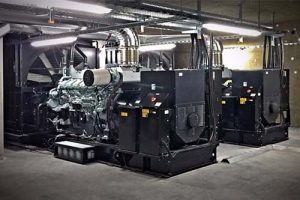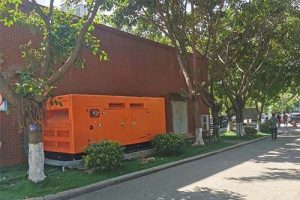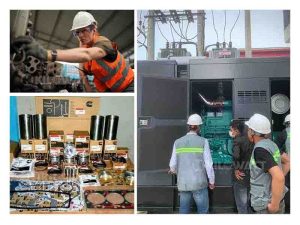In today’s fast-paced business environment, maintaining uninterrupted power is crucial. Power outages can halt operations, leading to significant financial losses, disrupted services, and potential damage to equipment. This is where diesel standby generators come into play. Renowned for their reliability and efficiency, diesel standby generators are essential for businesses to ensure continuous operations during unexpected power interruptions. By investing in these robust power solutions, businesses can safeguard against the detrimental effects of power outages, maintaining smooth and uninterrupted operations.
Top 5 reasons why every business needs a diesel standby generator?
A diesel standby generator ensures reliable power during outages, reduces operational costs with fuel efficiency, offers robust performance in various conditions, requires minimal maintenance, and provides long-term durability and dependability.
It is essential for maintaining business operations during power outages. With their reliable and efficient performance, they safeguard against financial losses and operational disruptions. Let’s explore these benefits in more detail.
Reason 1: The Necessity of Uninterrupted Power

Impact of Power Outages on Businesses
Power outages can have severe repercussions for businesses, affecting their bottom line and overall operational efficiency. Here are some key impacts:
- Financial Losses: Businesses can experience substantial revenue losses during downtime. For example, retail stores may miss out on sales, while manufacturing plants might halt production, leading to delays and unfulfilled orders.
- Operational Disruptions: Critical operations such as customer transactions, data services, and manufacturing processes can come to a standstill, impacting customer satisfaction and supply chains.
- Equipment Damage and Data Loss: Power interruptions can damage sensitive equipment and result in data loss or corruption, requiring costly repairs and data recovery efforts.
Case Studies
Real-world examples illustrate the significant impact of power outages on businesses:
- Data Centers: A major data center experienced a prolonged outage due to a severe storm, leading to substantial financial losses and customer dissatisfaction. The downtime affected their service delivery, emphasizing the need for reliable backup power.
- Manufacturing Plants: A manufacturing facility faced production delays and equipment damage during an unexpected blackout, disrupting their supply chain and affecting delivery schedules. This incident highlights the critical role of backup power in maintaining continuous operations.
Reason 2: Advantages of Diesel Standby Generators
Diesel standby generators are versatile and can be utilized in various applications, from powering small businesses to large industrial operations. They are ideal for data centers, hospitals, manufacturing plants, and financial institutions where continuous power is critical. The adaptability of diesel generators makes them suitable for different power requirements, ensuring reliable performance across multiple scenarios.
-
Reliability:
- Robust Performance in Various Conditions: Diesel standby generators are known for their ability to operate effectively under diverse environmental conditions. Their robust design ensures consistent power delivery, even in extreme temperatures or during severe weather events.
- Longevity and Durability of Diesel Engines: Diesel engines are built to last, offering a long operational lifespan. Their durability makes them an excellent investment for businesses that require a dependable power source over many years.

-
Efficiency:
- Lower Fuel Consumption Compared to Other Types of Generators: Diesel generators are more fuel-efficient than gasoline or natural gas generators, consuming less fuel while providing the same amount of power. This efficiency translates to lower operational costs.
- Cost-effectiveness Over Time: The higher fuel efficiency and lower maintenance requirements of diesel generators contribute to significant cost savings over time. Businesses can benefit from reduced fuel expenses and less frequent servicing needs.
-
Maintenance:
- Simplified Maintenance Requirements: Diesel generators are easier to maintain compared to other types of generators. They require fewer routine check-ups and have a simpler mechanical structure, which reduces the likelihood of breakdowns.
- Availability of Parts and Service Providers: The widespread use of diesel engines means that parts and service providers are readily available. This ensures that any maintenance or repairs can be performed quickly and efficiently, minimizing downtime.
Diesel standby generators offer unparalleled reliability, efficiency, and ease of maintenance, making them an ideal choice for businesses seeking a robust backup power solution. Their ability to provide consistent power under various conditions, combined with cost-effective operation and simplified maintenance, underscores their value in ensuring continuous business operations.
Reason 3: Comparison with Other Types of Generators
Diesel vs. Gasoline Generators
Fuel Efficiency and Storage: Diesel generators are significantly more fuel-efficient than gasoline generators. Diesel fuel has a higher energy density, which means it can produce more power per unit of fuel. Additionally, diesel fuel is safer to store for longer periods compared to gasoline, which can degrade more quickly.
Performance and Lifespan: Diesel generators typically have a longer lifespan and are more durable than their gasoline counterparts. The robust design of diesel engines allows them to handle heavy loads and continuous operation better, making them a preferred choice for businesses that require reliable long-term power solutions.
Diesel vs. Natural Gas Generators
Initial Costs and Operational Expenses: While the initial cost of diesel generators can be higher than that of natural gas generators, they tend to be more cost-effective over time due to lower fuel consumption and maintenance costs. Diesel generators do not rely on a continuous fuel supply from pipelines, which can be a vulnerability for natural gas generators during infrastructure disruptions.
Dependence on Gas Supply: Natural gas generators require a consistent supply of gas, which can be interrupted during natural disasters or infrastructure failures. Diesel generators, on the other hand, can store fuel on-site, ensuring a reliable power source during emergencies. This independence from external fuel supply makes diesel generators a more dependable choice for businesses.
By comparing diesel generators with gasoline and natural gas generators, it is clear that diesel generators offer superior fuel efficiency, durability, and reliability. These attributes make them an excellent choice for businesses looking to secure a steady and long-term power solution.
Reason 4: Key Features of Diesel Standby Generators
-
Fuel Storage and Management:
- Safe and Efficient Fuel Storage Solutions: Diesel generators require on-site fuel storage to ensure a reliable power supply during outages. Diesel fuel has a long shelf life and can be stored safely in large quantities. Proper storage solutions include secure tanks with spill prevention measures and regular fuel quality checks to avoid contamination.
- Handling and Logistics of Diesel Fuel: Efficient fuel handling and logistics are crucial for maintaining generator readiness. This involves regular fuel deliveries, proper handling to prevent spills, and routine maintenance of storage tanks to ensure fuel remains usable over long periods.

-
Automatic Transfer Switch (ATS):
- Seamless Transition During Power Outages: An ATS is vital for ensuring an uninterrupted power supply. It automatically detects power loss and switches the power source to the generator without manual intervention. This quick response time is crucial for businesses that rely on continuous power for critical operations.
- Importance in Maintaining Business Continuity: The ATS plays a critical role in maintaining business continuity by preventing downtime during power outages. By ensuring a seamless transition, it allows businesses to continue operations without interruption, protecting against financial losses and operational disruptions.
-
Load Management:
- Handling Varying Power Loads Efficiently: Diesel generators are designed to manage different power loads effectively. They can adjust their output to match the power demand, ensuring that essential systems receive adequate power while conserving fuel. This adaptability is especially important for businesses with variable power needs throughout the day.
- Preventing Overload and Ensuring Optimal Performance: Load management systems help prevent generator overload by distributing power evenly across all connected devices. This not only protects the generator from damage but also ensures that it operates at peak efficiency, providing reliable power without unnecessary strain on the system.
By incorporating these key features, diesel standby generators offer a reliable and efficient solution for businesses to maintain continuous power during outages. These features ensure that businesses can handle fuel logistics, seamlessly transition to backup power, and manage power loads effectively, making diesel generators a preferred choice for ensuring business continuity.
Reason 5: Practical Considerations for Businesses
Diesel standby generators come in various types to suit different business needs, including open type, silent type, containerized type, and mobile type. The open type generator is typically used in areas where noise is not a concern, while the silent type is equipped with soundproof enclosures generator for quieter operation. Containerized generators are designed for easy transport and secure storage, making them ideal for temporary power needs. Mobile generators are mounted on trailers or trucks, providing flexibility for businesses that require portable power solutions.
-
Assessing Power Needs:
- Calculating Power Requirements Based on Business Operations: To ensure that a diesel standby generator meets all power needs, businesses must assess their total power consumption. This includes identifying critical systems and equipment that require backup power during an outage. Calculating the total wattage needed will help in selecting an appropriately sized generator.
- Factors to Consider When Choosing a Generator Size: When selecting a generator, businesses should consider peak power demands, potential future expansions, and the specific requirements of sensitive equipment. It’s important to choose a generator that can handle both current and future power needs without risking overload.
-
Installation and Compliance:
- Site Selection and Preparation: Proper installation begins with choosing the right location for the generator. The site should be easily accessible for maintenance, have adequate ventilation, and be protected from environmental hazards. Preparation includes laying a solid foundation and ensuring there’s enough space for fuel storage and other necessary components.
- Adhering to Local Regulations and Standards: Businesses must comply with local building codes and environmental regulations when installing a diesel generator. This includes obtaining necessary permits, following safety guidelines, and ensuring the installation meets all legal requirements. Compliance not only ensures safety but also helps avoid potential fines and legal issues.
-
Cost Analysis:
- Initial Investment vs. Long-term Savings: The initial cost of purchasing and installing a diesel generator can be significant, but businesses should also consider the long-term savings. Diesel generators are fuel-efficient and require less frequent maintenance, leading to lower operational costs over time. Investing in a reliable power solution can prevent costly downtime and equipment damage.
- Financing Options and ROI: Various financing options are available to help businesses manage the upfront costs of a diesel generator. Leasing, loans, and other financial products can make the investment more manageable. Businesses should also calculate the return on investment (ROI), considering factors like reduced downtime, increased productivity, and enhanced operational resilience.
By carefully assessing power needs, ensuring proper installation and compliance, and analyzing costs, businesses can make informed decisions about investing in diesel standby generators. These practical considerations help ensure that the generator meets all operational requirements and provides reliable backup power in the most efficient and cost-effective manner.
Conclusion
Reliable power is essential for business continuity. Diesel standby generators provide robust, efficient, and low-maintenance power solutions, ensuring businesses remain operational during outages. Practical considerations like assessing power needs, proper installation, compliance with regulations, and cost analysis are crucial for selecting the right generator.
Final Thoughts:
Diesel standby generators play a critical role in maintaining business continuity by preventing financial losses, operational disruptions, and equipment damage during power outages. Their reliability and efficiency make them an indispensable asset for any business.
Businesses should evaluate their current power backup solutions and consider the benefits of diesel standby generators. Investing in a reliable power backup system can safeguard operations, protect against potential losses, and ensure long-term operational resilience. Contact us today to secure your business’s future by exploring diesel standby generator options.
FAQ
Why is a diesel standby generator important for businesses?
A diesel standby generator ensures that businesses have a reliable power backup during outages, preventing operational disruptions, financial losses, and equipment damage. It provides peace of mind by ensuring continuous power supply.
What are the main benefits of a diesel standby generator?
The main benefits include robust performance, fuel efficiency, longevity, and ease of maintenance. Diesel generators provide consistent power, lower operational costs, and have a long lifespan, making them a cost-effective solution.
How does a diesel standby generator protect business operations?
By providing uninterrupted power during outages, diesel standby generators keep critical systems running, prevent data loss, and maintain productivity. This protection is vital for operations that rely heavily on continuous power.
What types of businesses benefit most from a diesel standby generator?
Businesses that require uninterrupted power, such as data centers, hospitals, manufacturing plants, and financial institutions, benefit significantly from diesel standby generators. They ensure critical operations continue smoothly during power outages.
How does a diesel standby generator prevent revenue loss during outages?
By maintaining power to essential systems and operations, diesel standby generators prevent downtime that can lead to missed sales, unfulfilled orders, and dissatisfied customers. This continuity helps protect revenue streams during outages.
What are the key features to look for in a diesel standby generator?
Key features include fuel efficiency, automatic transfer switches (ATS) for seamless power transition, robust load management capabilities, and easy maintenance. These features ensure reliable performance and efficient operation.
How do diesel standby generators handle high power loads?
Diesel standby generators are designed to manage varying power loads efficiently. They can adjust their output to match demand, ensuring critical systems receive adequate power without overloading the generator, maintaining optimal performance.
What maintenance is required for a diesel standby generator?
Regular maintenance includes checking fuel levels, inspecting and replacing filters, testing the battery, and ensuring the generator runs smoothly. Scheduled servicing by professionals ensures the generator remains reliable and efficient.
